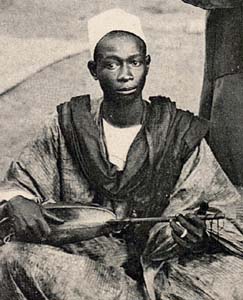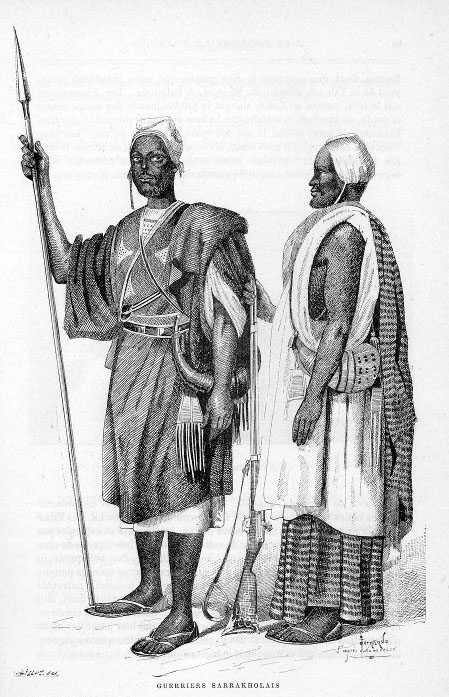|
Nyamakala
The ''Nyamakala'', or ''Nyamakalaw'', are the historic occupational castes among Islamic societies of West Africa, particularly among the Mandinka people. The ''Nyamakala'' are known as ''Nyaxamalo'' among the Soninke people, and ''Nyenyo'' among the Wolof people. They are found throughout the Sahel region, from Mali and Senegal to Chad and several other parts of the West African region historically known as the "Western Sudan". The term ''Nyamakala'' originally implied any talented people, but as slavery, social differentiation and stratification increased with Islamic religious violence called jihads, and later the colonial rule, their status fell to a lowly level below the nobles and free people. ''Nyama'' in the traditional Mandinka society implies "vital force", while ''Kala'' connotes "handle". Thus, any type of occupation that handled vital force of nature, were a Nyamakala. In its historic contexts, state Charles Bird, Martha Kendall and Kalilou Tera, ''Nyama'' has implied d ... [...More Info...] [...Related Items...] OR: [Wikipedia] [Google] [Baidu] |
Caste
Caste is a form of social stratification characterised by endogamy, hereditary transmission of a style of life which often includes an occupation, ritual status in a hierarchy, and customary social interaction and exclusion based on cultural notions of purity and pollution. * Quote: "caste ort., casta=basket ranked groups based on heredity within rigid systems of social stratification, especially those that constitute Hindu India. Some scholars, in fact, deny that true caste systems are found outside India. The caste is a closed group whose members are severely restricted in their choice of occupation and degree of social participation. Marriage outside the caste is prohibited. Social status is determined by the caste of one's birth and may only rarely be transcended." * Quote: "caste, any of the ranked, hereditary, endogamous social groups, often linked with occupation, that together constitute traditional societies in South Asia, particularly among Hindus in India. Althoug ... [...More Info...] [...Related Items...] OR: [Wikipedia] [Google] [Baidu] |
West Africa
West Africa or Western Africa is the westernmost region of Africa. The United Nations defines Western Africa as the 16 countries of Benin, Burkina Faso, Cape Verde, The Gambia, Ghana, Guinea, Guinea-Bissau, Ivory Coast, Liberia, Mali, Mauritania, Niger, Nigeria, Senegal, Sierra Leone, and Togo, as well as Saint Helena, Ascension and Tristan da Cunha ( United Kingdom Overseas Territory).Paul R. Masson, Catherine Anne Pattillo, "Monetary union in West Africa (ECOWAS): is it desirable and how could it be achieved?" (Introduction). International Monetary Fund, 2001. The population of West Africa is estimated at about million people as of , and at 381,981,000 as of 2017, of which 189,672,000 are female and 192,309,000 male. The region is demographically and economically one of the fastest growing on the African continent. Early history in West Africa included a number of prominent regional powers that dominated different parts of both the coastal and internal trade networks, suc ... [...More Info...] [...Related Items...] OR: [Wikipedia] [Google] [Baidu] |
Mandinka People
The Mandinka or Malinke are a West African ethnic group primarily found in southern Mali, the Gambia and eastern Guinea. Numbering about 11 million, they are the largest subgroup of the Mandé peoples and one of the largest ethnic-linguistic groups in Africa. They speak the Manding languages in the Mande language family and a ''lingua franca'' in much of West Africa. Over 99% of Mandinka adhere to Islam. They are predominantly subsistence farmers and live in rural villages. Their largest urban center is Bamako, the capital of Mali. The Mandinka are the descendants of the Mali Empire, which rose to power in the 13th century under the rule of king Sundiata Keita, who founded an empire that would go on to span a large part of West Africa. They migrated west from the Niger River in search of better agricultural lands and more opportunities for conquest. Nowadays, the Mandinka inhabit the West Sudanian savanna region extending from The Gambia and the Casamance region in Senegal to Iv ... [...More Info...] [...Related Items...] OR: [Wikipedia] [Google] [Baidu] |
Soninke People
The Soninke people are a West African Mande-speaking ethnic group found in Mali, Fouta Djallon, southern Mauritania, eastern Senegal, Guinea and The Gambia. They speak the Soninke language, also called the Serakhulle or Azer language, which is one of the Mande languages. Soninke people were the founders of the ancient empire of Ghana or Wagadou c. 300–1240 CE, Subgroups of Soninke include the Maraka and Wangara. When the Ghana empire was destroyed, the resulting diaspora brought Soninkes to Mali, Mauritania, Senegal, Gambia, Burkina Faso, Côte d'Ivoire, Guinée-Conakry, modern-day Republic of Ghana, and Guinea-Bissau where some of this trading diaspora was called Wangara. Predominantly Muslims, the Soninke were one of the early ethnic groups from West Africa to convert to Islam in about the 10th century. The contemporary population of Soninke people is estimated to be over 2 million. The cultural practices of Soninke people are similar to the Mandé peoples, and those of ... [...More Info...] [...Related Items...] OR: [Wikipedia] [Google] [Baidu] |
Wolof People
The Wolof people () are a West African ethnic group found in northwestern Senegal, the Gambia, and southwestern coastal Mauritania. In Senegal, the Wolof are the largest ethnic group (~43.3%), while elsewhere they are a minority. They refer to themselves as ''Wolof'' and speak the Wolof language, in the West Atlantic branch of the Niger–Congo family of languages. Their early history is unclear. The earliest documented mention of the Wolof is found in the records of 15th-century, Portuguese-financed Italian traveller Alvise Cadamosto, who mentioned well-established Islamic Wolof chiefs advised by Muslim counselors. The Wolof belonged to the medieval-era Wolof Empire of the Senegambia region. Details of the pre-Islamic religious traditions of the Wolof are unknown, and their oral traditions state them to have been adherents of Islam since the founding king of Jolof. However, historical evidence left by Islamic scholars and European travelers suggest that Wolof warriors and rul ... [...More Info...] [...Related Items...] OR: [Wikipedia] [Google] [Baidu] |
Mali
Mali (; ), officially the Republic of Mali,, , ff, 𞤈𞤫𞤲𞥆𞤣𞤢𞥄𞤲𞤣𞤭 𞤃𞤢𞥄𞤤𞤭, Renndaandi Maali, italics=no, ar, جمهورية مالي, Jumhūriyyāt Mālī is a landlocked country in West Africa. Mali is the eighth-largest country in Africa, with an area of over . The population of Mali is million. 67% of its population was estimated to be under the age of 25 in 2017. Its capital and largest city is Bamako. The sovereign state of Mali consists of eight regions and its borders on the north reach deep into the middle of the Sahara Desert. The country's southern part is in the Sudanian savanna, where the majority of inhabitants live, and both the Niger and Senegal rivers pass through. The country's economy centres on agriculture and mining. One of Mali's most prominent natural resources is gold, and the country is the third largest producer of gold on the African continent. It also exports salt. Present-day Mali was once part of t ... [...More Info...] [...Related Items...] OR: [Wikipedia] [Google] [Baidu] |
Senegal
Senegal,; Wolof: ''Senegaal''; Pulaar: 𞤅𞤫𞤲𞤫𞤺𞤢𞥄𞤤𞤭 (Senegaali); Arabic: السنغال ''As-Sinighal'') officially the Republic of Senegal,; Wolof: ''Réewum Senegaal''; Pulaar : 𞤈𞤫𞤲𞤣𞤢𞥄𞤲𞤣𞤭 𞤅𞤫𞤲𞤫𞤺𞤢𞥄𞤤𞤭 (Renndaandi Senegaali); Arabic: جمهورية السنغال ''Jumhuriat As-Sinighal'') is a country in West Africa, on the Atlantic Ocean coastline. Senegal is bordered by Mauritania to the north, Mali to the east, Guinea to the southeast and Guinea-Bissau to the southwest. Senegal nearly surrounds the Gambia, a country occupying a narrow sliver of land along the banks of the Gambia River, which separates Senegal's southern region of Casamance from the rest of the country. Senegal also shares a maritime border with Cape Verde. Senegal's economic and political capital is Dakar. Senegal is notably the westernmost country in the mainland of the Old World, or Afro-Eurasia. It owes its name to the ... [...More Info...] [...Related Items...] OR: [Wikipedia] [Google] [Baidu] |
Chad
Chad (; ar, تشاد , ; french: Tchad, ), officially the Republic of Chad, '; ) is a landlocked country at the crossroads of North and Central Africa. It is bordered by Libya to the north, Sudan to the east, the Central African Republic to the south, Cameroon to the southwest, Nigeria to the southwest (at Lake Chad), and Niger to the west. Chad has a population of 16 million, of which 1.6 million live in the capital and largest city of N'Djamena. Chad has several regions: a desert zone in the north, an arid Sahelian belt in the centre and a more fertile Sudanian Savanna zone in the south. Lake Chad, after which the country is named, is the second-largest wetland in Africa. Chad's official languages are Arabic and French. It is home to over 200 different ethnic and linguistic groups. Islam (55.1%) and Christianity (41.1%) are the main religions practiced in Chad. Beginning in the 7th millennium BC, human populations moved into the Chadian basin in great numbe ... [...More Info...] [...Related Items...] OR: [Wikipedia] [Google] [Baidu] |
Western Sudan
Sudan is the geographical region to the south of the Sahara, stretching from Western Africa to Central and Eastern Africa. The name derives from the Arabic ' (), or "the lands of the Blacks", referring to West Africa and northern Central Africa. Historically, the name was understood to denote the western part of the Sahel region. It thus roughly encompassed the geographical belt between the Sahara and the coastal West Africa. In modern usage, the term "Sudan" is also used in a separate context to refer specifically to the geographic region comprising the present-day countries of the Sudan, including its western region which forms a part of the country, and South Sudan, which gained its independence in 2011. In order to avoid confusion, the term "the Sudans" has become the preferred option when describing this region. Geography Sudan is marked by hay, forest cliffs and gallery forests along the rivers. Drought and livestock grazing threaten the area with desertificati ... [...More Info...] [...Related Items...] OR: [Wikipedia] [Google] [Baidu] |
Jihad
Jihad (; ar, جهاد, jihād ) is an Arabic word which literally means "striving" or "struggling", especially with a praiseworthy aim. In an Islamic context, it can refer to almost any effort to make personal and social life conform with God's guidance, such as struggle against one's evil inclinations, proselytizing, or efforts toward the moral betterment of the Muslim community (''Ummah''), though it is most frequently associated with war. In classical Islamic law (''sharia''), the term refers to armed struggle against unbelievers, while modernist Islamic scholars generally equate military ''jihad'' with defensive warfare. In Sufi circles, spiritual and moral jihad has been traditionally emphasized under the name of ''greater jihad''. The term has gained additional attention in recent decades through its use by various insurgent Islamic extremist, militant Islamist, and terrorist individuals and organizations whose ideology is based on the Islamic notion of ''jihad''. T ... [...More Info...] [...Related Items...] OR: [Wikipedia] [Google] [Baidu] |
Mande People
Mande may refer to: * Mandé peoples of western Africa * Mande languages * Manding, a term covering a subgroup of Mande peoples, and sometimes used for one of them, Mandinka * Garo people of northeastern India and northern Bangladesh * Mande River in Bosnia and Herzegovina * Mandé, Mali Surname * Hendrik Mande (d. 1431), Dutch mystical writer * Jerold Mande (b. 1954), American nutritionist and civil servant See also *Mand (other) *Manda (other) Manda may refer to: Places * Kafr Manda, Arab town in the Lower Galilee * Manda Upazila, an upazila in the Division of Rajshahi, Bangladesh * Manda, Kale, a village in Burma * Manda, Guinea, a town in the Labé Region * Manda, Jammu, India, a v ... * Mandi (other) {{disambig, geo, surname Language and nationality disambiguation pages ... [...More Info...] [...Related Items...] OR: [Wikipedia] [Google] [Baidu] |






